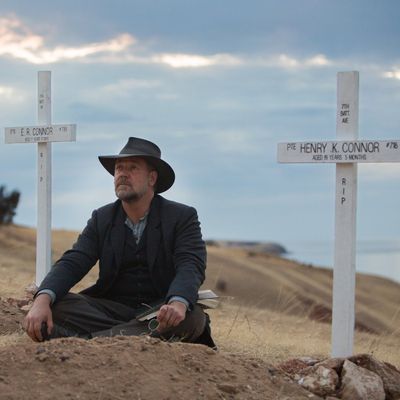
It’s clear that Russell Crowe has poured his heart and soul into the historical romance The Water Diviner, his first feature as a director. If only the film were better. Or if only Crowe brought the same subtlety to his direction that he brings to his performance as Joshua Connor, an Australian farmer mourning his three sons in the wake of World War I. When the film opens, the young men’s deaths — just three of the nearly half million soldiers from the United Kingdom and its dominions, France, and the Ottoman Empire consumed by the meat grinder of the ill-fated Gallipoli campaign — are still a raw wound in Joshua and his wife Eliza’s lives. He still reads from a book of fairy tales to three empty beds, five years after the battle. The bodies, we’re told, were never found — three nameless corpses in a battlefield strewn with them.
After his wife takes her own life from grief, Connor finally decides to head to Constantinople to try to attain some closure. If he can find his boys’ remains, he thinks, maybe they can be reunited with their mom. In the city, which is a bustle of Allied forces preparing to carve up the country, Connor finds lodging with Ayşe (Olga Kurylenko), a beautiful young widow whose own husband was likely killed in the war – and whose brother-in-law now wants to wed her. The Gallipoli battlefield is off-limits, but Connor sneaks in, and wins the respect of Major Hasan (Yılmaz Erdoğan) and Sergeant Cemal (Cem Yılmaz), the Turkish officers tasked by occupation forces to oversee the retrieval of Allied remains. (As Hasan notes, Connor is the only father who has traveled all this way to find his sons.) Meanwhile, sparks fly between Ayşe and Connor, and he befriends her adorable young son Omer. But she remains devout, proper, bending to the will of her stern, abusive brother-in-law.
The film also regularly cuts to flashbacks of the three brothers, whose scenes on the battlefield have real brutality and resonance. This welcome willingness to show us the horror of what happened to these young men makes it clear that we are not watching a movie about glory in combat. Rather, we’re watching a movie about the catastrophe of loss. And there is a germ of a good idea here — one about how both countries and people are often built out of that loss. For Turkey and Australia, the devastation of the war and Gallipoli in particular helped forge their national identities. For Australia and New Zealand, former colonies of the British Empire, the defeat at Gallipoli was a key event in their emergence as individual nations. Turkey, on the other hand, was built from the ruins of the Ottoman Empire, which entered WWI out of a series of unfortunate alliances; much of its postwar resistance and battle for independence was founded on the one victory at Gallipoli. But the people in the film are borne of this loss, too: Joshua’s search for the bodies of his dead sons leads to his casting his lot with the Turkish Nationalist rebellion; and Ayse’s loss of her husband eventually leads to her discovering her true self and casting off the patriarchy of Islam.
As noted earlier, Crowe himself brings nuance to his part, and his quiet, wounded delivery is the film’s greatest asset. I was also intrigued to see Erdoğan and Yılmaz, two of Turkey’s biggest comedians, in such serious parts; maybe it’s just me, but it seemed to lend their performances a certain, vital unpredictability. The same can’t be said for Kurylenko, who was such a winning, physical presence in Terrence Malick’s To the Wonder, but is completely adrift here as a repressed, forlorn Muslim woman. (Though, I should note, her phonetic Turkish is decent.) The film’s love story in general is a disaster, built as it is on awkwardly clunky, overzealously scored slo-mo scenes.
But The Water Diviner’s real problem is that it doesn’t really know what to do with the profound concepts it’s trying to tackle — issues of national identity and rebuilt lives and unfathomable grief. As a director, Crowe has neither the narrative shorthand nor the visual grace to manage this kind of complexity. He rushes us along from one incident to the next, which is particularly frustrating, as the plot often relies on coincidence, dream visions, and Connor’s seemingly mystical ability to find water. (A violent moment with some cartoonishly menacing invading Greeks also feels rather off-key, particularly for a film that tries to be so understanding of the warring sides in a conflict.) As we whipsaw between love story and war story, between individuals and nations, between East and West, we rarely feel like we’re watching connections being drawn, meaning being created, a whole coming together. Somewhere in this tangle might be a good movie, but Russell Crowe, however sincere his intentions, hasn’t found it.


